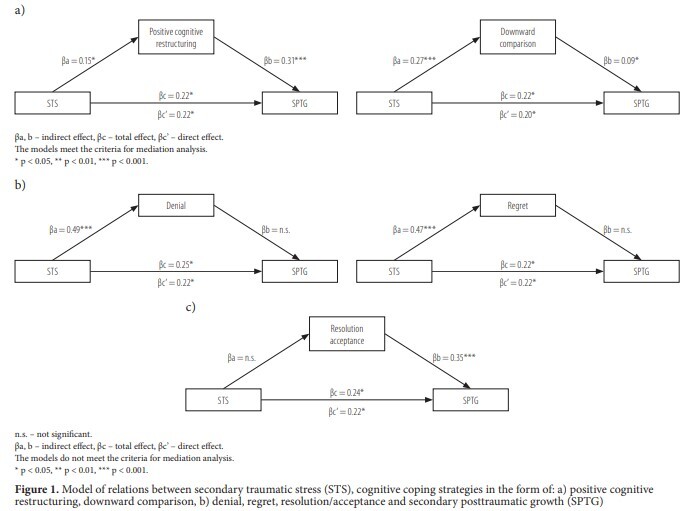Online first
Current issue
Archive
Most cited in 2024
About the Journal
Editorial Office
Editorial Board
Copyright and self-archiving policy
Information clause on the processing of personal data
Declaration of accessibility
Instructions for Authors
Instructions for Reviewers
Contact
Reviewers
2024
2023
2022
2020
2021
2019
2018
2017
2016
2015
2014
2013
Editing and translations
ORIGINAL PAPER
From negative to positive effects of secondary exposure to trauma – the mediating role of cognitive coping strategies
1
University of Lodz, Łódź, Poland (Department of Health Psychology, Institute of Psychology)
2
WSB Merito University, Łódź, Poland
Online publication date: 2023-12-11
Corresponding author
Paulina Michalska
University of Lodz, Department of Health Psychology, Institute of Psychology, Al. Rodziny Scheiblerów 2, 90-128 Łódź, Poland
University of Lodz, Department of Health Psychology, Institute of Psychology, Al. Rodziny Scheiblerów 2, 90-128 Łódź, Poland
Med Pr Work Health Saf. 2023;74(6):449-60
KEYWORDS
stressprofessionalsexposure to secondary traumasecondary posttraumatic stresssecondary posttraumatic growthcognitive coping strategies
TOPICS
ABSTRACT
Background: Professionals working with trauma victims can experience both negative and positive effects following exposure to secondary trauma. The aim of the study was to determine the relationship between secondary traumatic stress (STS), secondary posttraumatic growth (SPTG) and cognitive coping strategies and to establish the mediating role of cognitive coping strategies in the relationship between STS and SPTG. Material and Methods: A group of 500 professionals working with trauma survivors were surveyed. The Secondary Traumatic Stress Inventory, the Secondary Posttraumatic Growth Inventory and the Cognitive Processing of Trauma Scale was used. Results: The results indicated that 29% of professionals demonstrate a high intensity of STS, and nearly 34% exhibit a high level of SPTG. Denial and regret were positively correlated with STS; positive cognitive restructuring, resolution/acceptance and downward comparison were positively related to SPTG. Two cognitive coping strategies, i.e., positive cognitive restructuring and downward comparison, were found to act as mediators in the relationship between STS and SPTG. Conclusions: Understanding the effects of secondary exposure to trauma and the coping responses of professionals working with trauma survivors will support the development of prevention and intervention actions aimed at protecting them from the deleterious impact of exposure to secondary trauma at work and promoting secondary posttraumatic growth. Med Pr Work Health Saf. 2023;74(6):449–60.
Share
RELATED ARTICLE
We process personal data collected when visiting the website. The function of obtaining information about users and their behavior is carried out by voluntarily entered information in forms and saving cookies in end devices. Data, including cookies, are used to provide services, improve the user experience and to analyze the traffic in accordance with the Privacy policy. Data are also collected and processed by Google Analytics tool (more).
You can change cookies settings in your browser. Restricted use of cookies in the browser configuration may affect some functionalities of the website.
You can change cookies settings in your browser. Restricted use of cookies in the browser configuration may affect some functionalities of the website.






